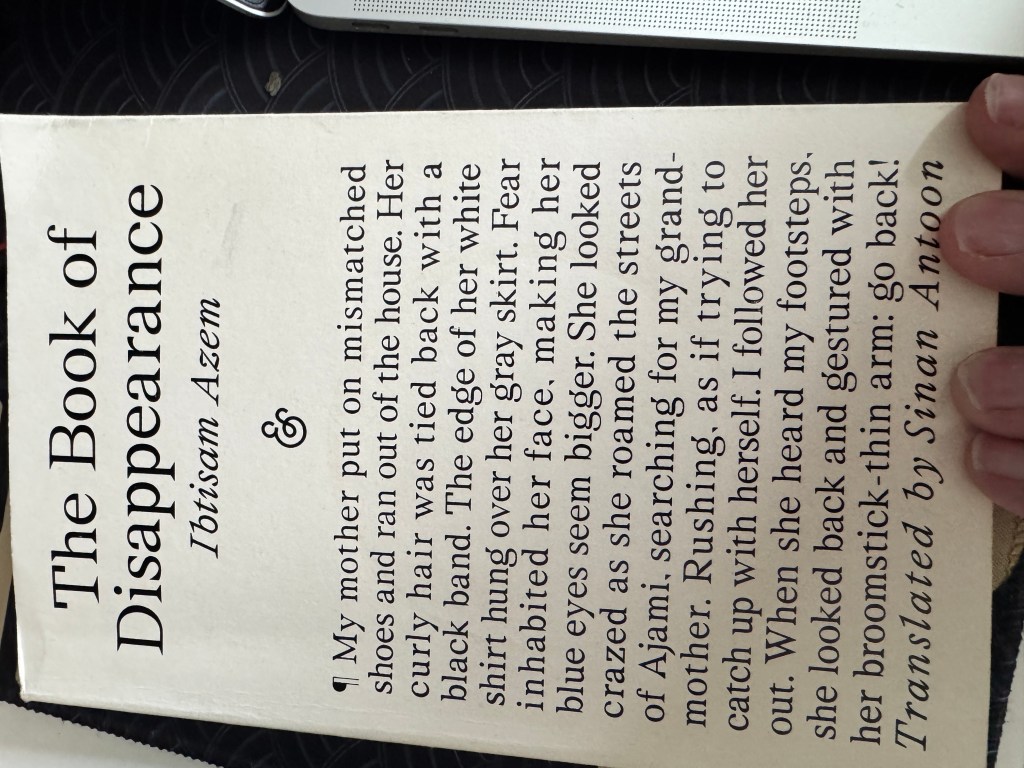
The book of Disappearance by Ibtisam Azem
Paslenstenian fiction
Original title -سفر الاختفاء
Translator Sinan Antoon
Source – Subscription edition
The translator of this book was a finalist for the old IFFP prize many years ago, before it became the Booker International Prize. I think we all want some novels that capture why events are happening in Palestine and Israel. This book, in some way, captures that by doing something so out of the blue, it leaves a void. What happens when the whole country, all of Palestine’s citizens, just aren’t there one morning? How will the Israelis react? That is the premise of the book. It is set in the Jaffa region. As I said in the last post, I’m drawn to speculative fiction, and this concept, as a way to describe the whole situation, grabbed me.
He went out barefoot and ran down to the third floor.
He rang the bell, confident that Alaa would open the door in no time, if he wasn’t at work. Taking time to open the door doesn’t mean anything necessarily. Alaa’s usually late.
Ariel rang the bell several times and then started banging on the door and calling out, “Alaa, Alaa, ata bu?”
When he went back up Zohar was getting ready to leave.
“He’s not answering.”
“You mean he disappeared with the others.”
“I don’t want to get into an argument, but I don’t think he’s disappeared. Maybe he’s wiped out and wasn’t able to go to work. We drank a bottle of wine last night and he was tired.
His phone is off and he only turns it off when he’s asleep.”
“You still don’t get what’s happening. Listen to your voicemail. Listen to the news. This is the nonchalant attitude that ruined our relationship. I’m going.”
He thinks his friend will still be there but isn’t
So what we see is the tale of what happened just before and then after, when all the Palestinians went through two friends on either side of the divide. Alaa is Palestinian. She is haunted by the events many years before, which were recounted to her by her grandmother about when she was thrown out of Jaffa and forcibly moved by the Israelis. Where our neighbour is now, Ariel, is a liberal Zionist. So when he wakes up the very next day, Alaa and all the Palestinians have gone, with no clue where or even how they just disappeared. Night. Add to this, we get Alaa’s notebooks that recount the event her grandmother had told her. The more significant part of the book focuses on how the authorities and Ariel react to the disappearance, and how their reactions are explained, which is at the centre of the whole book. This is one of those ‘what-if’ moments imagined.
Press offices have refused to give any special entry permits during the coming forty-eight hours. Going there would be of no use anyway, he thought as he took a sip of the coffee, which scorched his tongue. He called the IDF press office and the Tel Aviv municipality to check if it was necessary to get a special permit to go to Jaffa, or any other Arab area. He got the same answer. No permits are being given and he should call the following day.
How the goverment scrambles to cope twith what has happened!
As I said, I like certain speculative fiction, and this is one of those books that appealed to me before the prize. I think we all want to know a little bit more about this whole situation in Israel and Palestine. One must remember we have a massive part in the past history of this conflict, as we were at the heart of the discussions and plans to start Israel. The other thing about this book I’m talking about is that it was written over a decade ago, and maybe that’s why it could have been written at any time in the last few decades, which is a scary thought. I was reminded of what Dasa Drndic said about the tear-away section in her book, in Italy, with all the names of the dead Italian Jews. When they are taken out of the book, the book and the country fall apart in a way. What happens when your enemy disappears? This is what fuels the book, the questions of how, why, the aftermath and what happens with that void? But also it in someway for me as a reader left a few unanswered questions, I m not sure if I am dsoemtimes a read that likes to have everything tied up at times and in a way this book isn’t abkiut that it is about that void and the questions it gives those who are left but also how people react to that happening. It’s an interesting perspective on the whole situation and a fresh take on it. I wonder if they had read books by Saramago or something like ‘The Day of the Triffids, ‘ which deals with a sudden change. This is something like what Wyndham might have written about this situation.I like the idea of this book in part, it works, but for. Me there was a part that was missing at times if that makes sense a sort ofwhy and how to the events but maybe they were left vague for a reason!
Related
Published by







